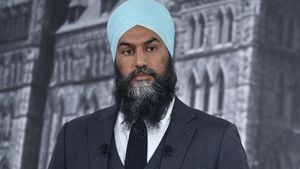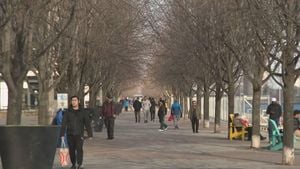Andrey Rublev, the world No. 9 and reigning champion of the Qatar Open, is gearing up for the Dubai Duty Free Tennis Championships, but this time, he brings with him not just his tennis prowess but deep reflections on mental health struggles. Fresh off his victory at the Qatar Open, the 27-year-old Russian is determined to make this year’s return to Dubai more successful than the last. Last season, he was defaulted during the semifinals, having lost his temper at the officials - one of several incidents pointing to his previous struggles with mental health.
Rublev candidly opened up about how these struggles left him feeling completely lost. I was kind of in a loop, lost with myself for a couple of years of not finding the way, not knowing what to do, what for, he reflected when speaking to The National. He recounted this period as one where he questioned the very purpose of life. The emotional turmoil he experienced was not just fleeting, it was something I felt for many years and I could not take it anymore, he emphasized.
The pressure of the sport, along with personal challenges, increased Rublev's frustration on the court, often leading to self-destructive behavior like smashing rackets and showing aggression toward officials. Last year, when he clashed with the line judge, the aftermath forced him to reflect on his conduct on and off the court. Sometimes you learn the most from the worst cases, he noted, referring to how his disqualification taught him valuable lessons about self-control and accountability.
His road to recovery began unexpectedly last July, when he engaged with fellow tennis player Marat Safin, whose own career was marred by emotional outbursts and struggles. Safin made me understand myself, Rublev recalled, describing the talk as pivotal, steering him away from what he described as rock bottom. That was the restart from the bottom, he said, highlighting how these conversations became the groundwork for his renewed focus on mental wellness and responsibility.
Interestingly, Rublev had also spent a year taking antidepressants, but he reached a point where he felt they were no longer helpful. I realized, it was not getting worse, but something felt weird, he shared, when explaining his decision to stop the medication. Instead, he now strives to practice self-responsibility, which he openly writes on his shoes as a constant reminder of his personal commitment to growth.
This shift is tied to his broader mission of being honest with himself, acknowledging the disconnect many people have between their perceptions and their truths. The main thing is to be honest with yourself... most people are not even honest with themselves, he reflected, urging others to break free from self-deception.
Rublev’s approach has been met with both admiration and hope from the tennis community, where discussions about mental health are often avoided. His willingness to share his struggles is undoubtedly paving the way for others, creating space for dialogue around topics usually swept under the rug. This sentiment is echoed widely, as many feel it takes real courage to admit to and discuss mental health issues openly.
Now, as he prepares for his first-round match against French qualifier Quentin Halys, Rublev is more than just ready to compete again; he seems poised to reclaim his mental and emotional stability on the court. With his focus redirected from the fear of failure to the joy of play, he stated, I’m not happy, I’m not bad, but I’ve found my base. That’s the beginning. His past experiences have undoubtedly shaped his approach and outlook on tennis, making him more resilient than before.
Looking back over the last two years, the growth Rublev has experienced is evident. Once consumed by his frustrations and self-criticism, he is now actively seeking techniques to manage his mental well-being and stay focused on achieving success—both personally and professionally.
Rublev’s open dialogue about mental health has played an integral role not just for his own healing but serves as inspiration for aspiring athletes who grapple with similar challenges. The message he conveys is not just about winning matches but about reclaiming one’s mental space and addressing the burdens bearing down on so many. Every time he steps on the court, Rublev carries with him the lessons of his past, the conversations with Safin, and the resolve to forge forward.
With the 2024 Dubai Duty Free Tennis Championships on the horizon, Rublev remains optimistic about what he can achieve: not just as an athlete but as someone who is carving his path toward wellness and emotional stability. The resilience he shows now demonstrates not only his growth as a player but as a person—transforming adversity to determination.



